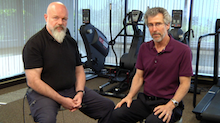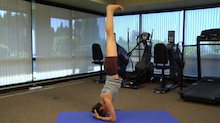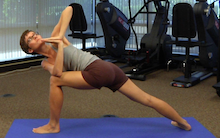In January, H&W faculty member Elizabeth Hampton PT, WCS, BCB-PMD presented at the APTA’s Combined Sections Meeting in San Diego, CA in a presentation sponsored by the Orthopedic Section. The presentation was called “Core Rehab without ‘Going There’: Evidence Supporting Direct and Indirect Evaluation and Treatment of PFM Dysfunction.”
In her talk, Elizabeth discussed contributing factors to pelvic health and continence, including muscular, fascial, neural, biomechanical and motor control factors. She also noted a pilot study done by HW’s own Stacy Futterman, PT, MPT, WCS, BCB-PMD, which prompted a wonderful discussion about the role hip labral tears and femoral acetabular impingement has on the pelvic floor.
Elizabeth was gracious enough to share details about her presentation with Pelvic Rehab Report. Below is what she had to say about this topic.

EH: In this talk, I focused on pelvic health and continence being a distinct specialty within orthopedic manual therapy. Considering the interrelationship between musculoskeletal, urinary, colorectal and sexual function, I believe an integrative understanding of all systems is required for autonomous, direct-access physical therapists as we look towards Vision 2020. Indeed, IFOMT’s definition of orthopedic manual therapy correlates directly to the women’s health physical therapist.
In my talk, I proposed that a comprehensive pelvic health and orthopedic manual therapy evaluation is required for the evaluation and treatment of pelvic pain and pelvic health conditions. I noted (and the audience agreed) that the reality is that not all PTs will have a comprehensive pelvic health knowledge base. Key items for a pelvic pain exam have not been standardized for physical therapists that do not have training in direct pelvic health and continence evaluation and treatment methods. Barriers to clinician evaluation of pelvic floor function and dysfunction can include education, apprehension, aversion, risk management concerns and knowing how and when to include pelvic health questions during client history- taking.
One example of a lack of comprehensive pelvic health knowledge base is the therapist who instructs on pelvic floor contractions - without prior assessment by the therapist - during a clinician- designed core rehabilitation program. Without evaluation, the competence of pelvic floor muscle contraction is in question. Cueing a muscle contraction without assessment, therefore, is not a skilled intervention in and of itself.
This prompted a discussion of whether a direct pelvic floor evaluation is indicated with all clients needing core rehabilitation. We also discussed external (i.e. indirect) assessment via the Ischiorectal fossa or client’s hand on their sacrum/ischii as options for a general screening. Further research is needed to determine when direct (internal) or indirect (external) evaluation methods of PFM contraction/relaxation are appropriate.
I encouraged all clinicians to attend the minimum of a Level One Pelvic Floor course through Herman & Wallace or the APTA. Regardless of the long term clinical interest of each PT in pursuing pelvic rehab as a focus, a Level One PF course would enable each clinician to perform a fundamental history, effective bowel and bladder screening and an understanding of the anatomy of the pelvic ring, even if they chose not to perform direct PFM assessment and treatment in the clinic.
I observe that the attitude of ‘us’ vs. ‘them’ still persists between clinicians who do have women’s health PT skillset and those who do not. This attitude has the potential to impair clinical collaboration and the inclusion of PTs of other specialties into the study of pelvic health, continence and women’s health physical therapy. Our profession would be well-served to focus on meeting the needs of the clients through a comprehensive orthopedic/ biomechanical/ urogyn/ colorectal knowledge base, rather than by separating client treatment according to clinician toolbox (i.e. women’s health vs. orthopedic.)
The Description of Specialty Practice for the Women’s Clinical Specialty includes a highly-detailed orthopedic skillset. Likewise, women’s health physical therapy is a highly-specialized field within orthopedic manual therapy. Both toolboxes are required for comprehensive evaluation and treatment of clients with women’s health, pelvic health and continence dysfunction.

In April of this year, H&W is thrilled to be offering a brand new course on Bowel Pathology and Function. Our Pelvic Rehab Report blogger interviewed the instructor Lila Abbate, PT, DPT, MS, OCS about her new course.
1. What can you tell us about this continuing education course that is not mentioned in the "course description" and "objectives" that are posted online?
This course goes into detail about laxative weaning, how and when to use over-the-counter products and some supplements, food that are helpful to aid in bowel function. The course looks at different concomitant past medical histories such IBS, the neurogenic bowel with a SCI patient, MS and fibromyalgia and the progression of their bowel issues and how PTs can assist these patients. The course discusses evidence-based treatment vs. anecdotal and clinical experiences.
2. What inspired you to create this course?
I felt that there was a need for a course like this. So many patients have very complicated bowel issues and there is so much more to think about regarding a complicated bowel patient. As a pelvic PTs, I realized that I needed to understand more of the general knowledge of the gut and how physicians approach the problem, how so many over-the-counter products can be destructive to normal bowel function and the dysfunction bowel patients that most patients get in to and cannot get out of and how we are able to help them.
3. Can you describe the clinical/treatment approach/techniques covered in this continuing education course?
As all H&W courses have an emphasis on the manual orthopedic approach, we screen and treat both vaginal and rectal pelvic floor muscles in this course, evaluate and treat for diastasis recti in both the male and female population and we discuss the use of biofeedback for the complicated patients. We also complete rectal ballooning as part of the lab.
4. Why should a therapist take this course? How can these skill sets benefit his/ her practice?
If you have bowel patients that have been difficult to take through the course of care, or if you took PF2A a while ago and need a refresher on bowel pathology, or if have a deeper interest in bowel dysfunction, this course will give you the additional knowledge that you are looking for.
5. How has this knowledge and skill set benefited you in your own practice?
My practice specializes in pelvic pain and bowel dysfunction. Bowel dysfunction is such an underserved population within pelvic floor dysfunction population. In the US alone in 2004, a primary complaint of constipation was responsible for 6.3 million patient visits to medical care centers, resulting in total (direct and indirect) costs of $1.7 billion, which we can surmise 8 years later, has almost doubled and these patients need care.
6. What resources and research were used when writing this course?
Evidenced-based research is the primary guide used to present most information. However, clinical expertise and anecdotal information cannot be ignored due to the fact that we have such low peer-reviewed articles presented on this topic. Information gathered from medical conferences will also be presented.
This course will be offered April 13-14 at Stony Brook University in New York. Don't miss this excellent opportunity - Register today!
We are thrilled to announce the launch of a brand new series of online courses, Integrative Techniques for Pelvic Floor & Core Function. This three-part series instructs on low-tech, non-invasive techniques to address pelvic floor dysfunction that draw from Yoga, Tai Chi, Qigong, Feldenkrais and conventional rehab therapies, with a goal of guideing clients toward improved health and function. These courses were developed and are instructed by Bill Gallagher, PT, CMT, CYT and Richard Sabel, MA, MPH, OTR, GCFP. Throughout each course in this series, Bill and Richard will walk you through various exercises that you are encouraged to perform at home, in order to better prepare you to guide your own patients through the same exercises in your setting of care.

Part A lays the foundation for the series by covering anatomy, core concepts related to "habits of the mind," and the physiology of breathing as it relates to the pelvic floor. Part B will begin by covering modifications of yoga poses to address soft tissue tightness, functional movement, and pelvic dysfunction. The pelvic clock in supine from Part A will be reviewed, and techniques for the facilitation of a client’s understanding of the pelvic clock will be presented. Part C concludes the series with integrating the pelvic floor muscles into everyday functional movements such as standing, lifting from a squat, bridging, and going up steps, as a means to maintain the suppleness (strength and flexibility) of the pelvic floor. These courses can be taken sequentially or in any order.

Don't miss Bill and Richard teaching their live seminar as well. The two course, Integrative Techniques for Pelvic Floor & Core Function: Weaving Yoga, Tai Chi, Qigong, Feldenkrais and Conventional Therapies will be held this September in New London, CT!
Two weekends ago in San Diego, Herman & Wallace offered the first course event of our brand new course, Care of the Pregnant Patient. This course is part of a new series on pregnancy and postpartum, written and developed by Herman & Wallace faculty members (as we call them, our "Preg-perts").
Lisa Lahr, DPT attended this course and wrote of her experience:
The course Care of the Pregnant Patient was a wonderfully put together course. The course outline and handouts were wonderful, easy to follow and gave the right amount of information. Many physical therapist work with pregnant patients who have pain during their pregnancy. We have all had the patient for whom we run out of ideas how to help and have thought that she would feel better once the baby is born. After this class, I do not feel like I will ever have to feel this way again. I have learned so many things that I can try and teach my patients to help with their pain during pregnancy.
Another key part of the class was discussing ways to market to providers and the community to grow a strong program for pregnant patients to attend. We also discussed ways to improve relationships between providers and therapy for this patient population.
Jenni Gabelsberg is a wonderful instructor with a very strong knowledge base in women’s health and pregnancy patients and she provided great examples of what we talked about in class.
Overall, this class allowed me to leave with many new “tricks in my tool bag” and a new appreciation for the things that we can do for a pregnant patients. I look forward to attending the Care of the Postpartum Patient and would highly recommend this class to anyone that treats pregnant patients.
We will be offering this course two more times in 2013: in April in Houston, TX and in September in Winter Park, FL.
In March of this year, H&W is thrilled to be offering a brand new course on Pudendal Neuralgia. Our Pelvic Rehab Report blogger interviewed the two instructors Loretta J. Robertson, PT, MS and Tracy Sher, MPT, CSCS about their course.

1. What can you tell us about this continuing education course that is not mentioned in the "course description" and "objectives" that are posted online?
Loretta: First, I just want to say we are both thrilled to be able to present this course and share all that we have learned in working with these patients. I have always wanted instructors in continuing education courses to “walk me through” their thinking processes. “Why did this patient history and presentation guide you toward diagnosis or treatment A as opposed to B?” So we are going to incorporate that information throughout the entire course.

Tracy: Yes- this is exciting for us to have this opportunity to blend anatomy and science with clinical decision making. We both see patients from all over the country (and world) who are concerned about having pudendal nerve entrapment or pudendal neuralgia. We have seen pudendal decompression surgery patients pre-op and post-op; and we have also helped patients avoid unnecessary surgeries. They are desperate for answers. What we find is that often times patients are misdiagnosed and go through many procedures or surgeries that may not be effective or necessary. Class participants will receive valuable information regarding clinical insight about appropriate evaluation strategies and clinical decision-making. Is it really a pudendal issue? Now what?
2. What inspired you to create this course?
L: PN is often misdiagnosed. These patients see on average 5-10 medical professionals before getting diagnosed and often suffer for years without help. I love teaching and would like to pass on all that I have learned so more therapists and patients can benefit. Also, at the hospital, we see patients from around the country and often other countries. I am often asked by PT’s how to help these patients. I thought it would be easier to put the information into a course because playing phone tag with multiple therapists is getting difficult!
T: We are both so passionate about what we do and see daily how we can make such a profound effect on patients and their families dealing with pudendal neuralgia. I agree that we need more therapists evaluating and treating this population, armed with exceptional clinical reasoning skills. In addition to the typical didactic environment, we hope to foster discussions by sharing case studies and allowing participants opportunities to share questions and comments about complex cases. We have seen a need to share this knowledge. Let’s do this!
3. Can you describe the clinical/treatment approach/techniques covered in this continuing education course?
L: We both strongly believe in an eclectic approach to treatment, so we will not be focusing on any one specific modality. I have found these patients really need a comprehensive approach to care – so we will incorporate education, ther-ex, manual therapy, functional activities and the latest information on research into chronic pain and the central nervous system.
T: We also want participants to recognize when less is more. Some manual treatment approaches can be too aggressive. There are times when it’s important to back away from traditional manual treatments and focus more on integrative neural reeducation and desensitization strategies. Informing patients about the reasons behind this treatment approach are important for buy-in and patient compliance and treatment success.
4. Why should a therapist take this course? How can these skill sets benefit his/ her practice?
L: Physical Therapists are often the first medical practitioners correctly identifying patients with pudendal neuralgia. We desperately need more PT’s who can recognize the diagnosis and start treatment with these patients early. I am always searching for therapists around the country where we can refer patients. Also, having this knowledge allows the therapist to start appropriate care and help the patient avoid unnecessary tests, injections and often surgery.
T: In relation to Loretta’s statement, sometimes the opposite is true as well. Physical Therapists are treating patients thinking that they have pudendal neuralgia, but have not properly ruled other out other issues. This is why we are so excited to share more insight about this area of pelvic therapy. I am often not the first therapist to see these complex pelvic pain patients. Sometimes they have seen two to three others before they find me. I am always surprised by how many important clinical findings are missed. This is not because the therapists are unwilling to do the best evaluation or treatments. They simply have not had advanced training or exposure to approaches in this area. We want the class participants to have the right clinical knowledge and skills to efficiently and effectively know how to treat these types of patients. This is complex stuff- Is it biopsychosocial, neural, local tissue or nerve irritation or a combination of all of this?
5. How has this knowledge and skill set benefited you in your own practices?
L:I can honestly say, this has changed my practice completely. I am now an integral part of a medical team and have an equal voice with the physicians in helping to decide the best medical approach for each patient. I also have far too many patients!
T: Loretta works with one of the leading surgeons dealing with pudendal issues. He admits openly and regularly that he relies on Loretta for her clinical judgment for the right plan of care with patients. Similar to Loretta, I am either the first person to finally point the patient in the right direction or brought on by a physician or healthcare team to play an integral role in care. This is because we are really able to discern possible driving factors of the symptoms and find conservative ways to treat these patients who have complex histories of pain and/or pelvic floor dysfunction.
6. What resources and research were used when writing this course?
L: We reviewed mountains of research articles, and the information on Chronic Pain came from the books, courses and personal conversations with Lorimer Moseley and David Butler. As previously mentioned, I also work with one of the physicians specializing in PN for the last 7 years. Through this time we have come to understand more, improved our diagnostic skills and treatment ideas. Our daily problem solving discussions have helped us improve our care. I will bring all that we have learned – both the successes and failures to the course.
T: There’s not a lot of research specific to evaluation and treatment of pudendal nerve diagnoses yet, but this is moving in a forward direction. Also, some of the criteria for determining these diagnoses are often misleading. We want to help direct the participants to find good research on pelvic pain diagnoses and the brain/pain connection. We are excited to present pelvic pain and brain research in conjunction with our clinical experience and outcomes.

We are thrilled to announce that Part B of our brand new online course series, Medical Therapeutic Yoga is now available!
This course was written and is instructed by Ginger Garner, MPT, ATC and presents an evidence- based method for using yoga as medicine in rehabilitation and wellness. Part B is intended as a completment Part A . Topics covered include respiration for optimal patient outcomes, applied biomechanics in asana, and achieving structural balance. Neurophysiology, stability, and joint function in practice are also covered, as well as myofascial release and soft tissue mobilization as they relate to medical therapeutic yoga.
In addition to these brand new online courses, H&W will be sponsoring two live seminars taught by Ginger in 2013: Yoga as Medicine for Labor and Delivery and Postpartum, which will be offered in Arlington, VA in October, and Yoga as Medicine for Pregnancy, which we will be offeing in Greenville, SC in September.
We are thrilled be offering these brand new courses!
In addition to all the great things our faculty will be up to at this year's APTA Combined Sections Meeting (CSM) - read THIS ENTRY of Pelvic Rehab Report for an update on the happenings in San Diego - H&W faculty members Bill Gallagher and Richard Sabel will be presenting at two upcoming conferences.
On April 24th, Bill and Richard will present "Explore the Pelvic Floor Plus More: The Foundation of Health in the Body" at the American Occupational Therapy Aassociations's Annual Conference and Expo in San Diego CA.
In June, these two will present a similar seminar, this one geared towards the yoga therapist at the Symposium on Yoga Therapy and Research conference in Boston, MA. This seminar will cover how, by bringing awareness, strength, and suppleness to thes muscles of the pelvic floor, yoga therapists can not only address incontinence, sexual fulfillment, pregnancy and postpartum health issues, but can also alleviate pain in the pelvis, hips, knees, and back, improve respiration, and facilitate functional activities.
Congrats and thanks to Bill and Richard for spreading the "good word" on the pelvic floor!

We are thrilled to announce the launch of Part A of our brand new online course series, Medical Therapeutic Yoga!
This course was written and is instructed by Ginger Garner, MPT, ATC and presents an evidence- based method for using yoga as medicine in rehabilitation and wellness. Ginger has been lecturing on this topic throughout the United States since 2000. Her medical yoga graduate and post-graduate program, Professional Yoga Therapy, which teaches non-dogmatic, evidence-based care through fostering an east/west multi-disciplinary team approach, is a first of its kind in the US.
In addition to this brand new online course, H&W will be sponsoring two live seminars taught by Ginger in 2013: Yoga as Medicine for Labor and Delivery and Postpartum, which will be offered in Arlington, VA in October, and Yoga as Medicine for Pregnancy, which we will be offeing in Greenville, SC in September.
We are thrilled be offering these brand new courses!
There are only five seats left in the Pelvic Floor Level 2A course in Boston on March 22-24!
This course will be offered at Marathon Physical Therapy and is the designed as a next step (after Pelvic Floor Level One) in completing the clinicians’ ability to comprehensively evaluate the female and male pelvic floor by learning colorectal examination and treatments.
Don't miss this chance to build you clinical skill set and take advantage of the only Northeast offering of this course in 2013 - REGISTER today!

Our host asked the participants of the most recent 11-day pelvic rehab training seminar in Dubai, United Arab Emirates to hold the flag of their home country. Look at the "global village" that attended this course! These physiotherapists will be returning to their home countries as Herman & Wallace-trained "Pelvic Ambassadors".
There's Institute-founder, Holly Herman, who instructed this course, in the middle.
















































